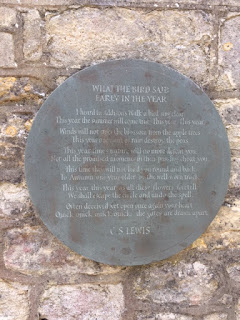As I work on a class I’m teaching Wednesday nights, “C. S. Lewis: Wise Mentor," I can’t help but bring to mind Lewis’s increasing frustration with the culture of atheism and materialism—putatively wedded to the advance of science—which he found ultimately unsatisfying and dehumanism.
Is this something for Lewis alone? Why should we care? Because we living in an increasingly materialist age. And by that, I don’t mean that we like to buy lots of stuff while shopping. That’s a huge spiritual problem, and it’s a form of materialism, but that’s not what I’m talking about. I’m talking about defining ourselves by the material world, not by anything transcendent.
Stephen Pinker, the influential Harvard cognitive scientist, in his denial of the soul, says it so well,
“The neuroscientific worldview—the idea that the mind is what the brain does—has kicked away one of the intuitive supports of religion. So even if you accepted all of the previous scientific challenges to religion—the Earth revolving around the sun, animals evolving, and so on—the immaterial soul was always one last thing that you could keep as being in the province of religion. With the advance of neuroscience, that idea has been challenged.” Stephen Pinker
 |
| Can I put in a shameless plug for my book? |
“Materialism (or naturalism) holds that matter constitutes the fundamental substance in all things, and thus that mental aspects and consciousness are purely results of material interactions.”
This is different from methodological naturalism, which asserts that science restricts itself to the relations within the natural world. But sometimes scientists act as if both naturalisms are coterminous.
 But to conflate these two is destructive for science and for us as human beings. Because we naturally seek something more than this material world has to offer. Here I agree with Lewis, who was convinced that early 20thcentury materialism was desolate. It led him toward Christ. Why? Because he found, along with vast majority of human beings, that we have desire to something more than the material world can provide. Materialism left no place for joy, for the Bible calls “abundant life” (John 10:10) or Aristotle called “human flourishing.” Materialism is, in a word (or two), unsatisfying and desolate.
But to conflate these two is destructive for science and for us as human beings. Because we naturally seek something more than this material world has to offer. Here I agree with Lewis, who was convinced that early 20thcentury materialism was desolate. It led him toward Christ. Why? Because he found, along with vast majority of human beings, that we have desire to something more than the material world can provide. Materialism left no place for joy, for the Bible calls “abundant life” (John 10:10) or Aristotle called “human flourishing.” Materialism is, in a word (or two), unsatisfying and desolate.
And does this mean something to you and me today? If I’m reading the tea leaves properly, we also live in a time where the automatic reaction is that we’re “nothing more than a pack of neurons,” as the famous geneticist Francis Crick once phrased it.
And so I turn back to “St. Clive” Staples Lewis. Posted today on Addison’s Walk is a poem he wrote about the very path, but it’s not hard to see he’s talking about moving beyond the self-imposed gates of materialism to a wider world:
I heard in Addison’s Walk a bird sing clear:
This year the summer will come true. This year. This year.
Winds will not strip the blossom from the apple trees
This year, nor want of rain destroy the peas.
This year time’s nature will no more defeat you,
Nor all the promised moments in their passing cheat you.
This time they will not lead you round and back
To Autumn, one year older, by the well-worn track.
This year, this year, as all these flowers foretell,
We shall escape the circle and undo the spell.
Often deceived, yet open once again your heart,
Quick, quick, quick, quick!—the gates are drawn apart


No comments:
Post a Comment